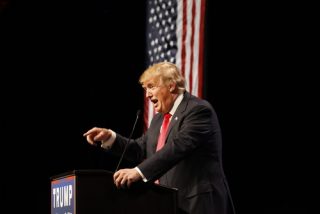 This weekend, to deflect some attention from the ever-growing list of women who have alleged sexual assault, Donald Trump has outlined his 100-day plan for for his proposed administration. In it, he has promised that for every federal regulation passed, two existing regulations must be eliminated. That “get one new, get rid of two” logic when the topic relates to updating one’s wardrobe, but it’s pretty far from realistic if we’re talking about laws.
This weekend, to deflect some attention from the ever-growing list of women who have alleged sexual assault, Donald Trump has outlined his 100-day plan for for his proposed administration. In it, he has promised that for every federal regulation passed, two existing regulations must be eliminated. That “get one new, get rid of two” logic when the topic relates to updating one’s wardrobe, but it’s pretty far from realistic if we’re talking about laws.
Promises to single-handedly eliminate federal regulation have become something of a Republican standard during presidential campaigns, even if past promises haven’t been as patently ridiculous as Trump’s. The Mitt Romneys and Chris Christies of yesterday have desensitized listeners with their bravado about repealing the laws of an overreaching government. Now, a candidate who has no qualms about disregarding the actual scope of a president’s legal authority, is making bizarre guarantees that are going unchecked by anyone still listening.
I’m sure many a Trumpkin will point to President Obama’s “tyrannical” use of executive orders as precedent for what their candidate has proposed. But the devil is in the details here. Federal regulations are not the same things as executive orders. Federal regulations are laws adopted by federal regulatory agencies as the result of a lengthy legislative process. That process involves research, open discussion and hearings. Administrative regulation are, by their very nature, a collaborative process; by contrast, executive orders are meant to be made by the flourish of a presidential pen. But (and this is a pretty big “but,”) executive orders cannot constitutionally create new law. Executive orders merely direct an existing agency to enforce an existing law. For example, when President Obama issued an executive order in 2012 regarding immigration, he was directing agencies including INS, DHS, and ICE to use their existing power by prioritizing the deportation of certain groups of immigrants.
If any president were inclined to follow through on a promise to demolish federal regulations, he or she would, theoretically, have three available means with which to do so:
- Ask Congress to repeal the regulation. This would be the most direct way to nix an existing law. Under the Congressional Review Act, Congress can resolve to disapprove a regulation. One big problem here is that Republicans would need to emerge from this election with a filibuster-proof majority in Congress – which becomes less likely by the minute as the GOP continues its Trump-fueled implosion. And if the campaign ads like Pat Toomey’s (R-PA) are any indication, Republican Senators and Congressmen are eager to distance themselves from Trump and his nonsense. So I wouldn’t bet on any rush to rally behind a President Trump. Another glitch is that the Congressional Review Act (which, I might point out, has only been successfully used to invalidate a regulation once in its 20-year history) only allows Congress the power to invalidate regulations passed since May of 2016.
- Hope for judges to overturn the regulations. Sure, this could work, but only if there’s active litigation. And let’s be real. Donald Trump isn’t even following through on his own plans to start lawsuits. He’s certainly not going to orchestrate federal litigation for each regulation he’d like stricken from the books.
- Use the regulatory process to pass new regulations. Ding, ding, ding! This is the right way to change or repeal regulations. Except that it can’t be done quickly or unilaterally. Federal administrative agencies are complex beasts, and the regulations they pass are not usually the product of flippancy. The road to adopting, changing, or repealing federal regulation can take years, and the outcome is never certain. Okay, I take that back. One thing is certain. The process would examine each regulation independently, and would never result in “get one new, get rid of two.”
Trump’s willfully-blind supporters cheer fervently at his promises to unilaterally repeal federal legislation; nothing could be more illustrative of the dangers to which this man has exposed the American government. The executive branch lacks the power to create or destroy law — its only function is to enforce it. Trumpeters are willing to sacrifice our entire system of checks and balances for some amorphous (not to mention unwise, illogical, in most cases, totally uninformed) goal of deregulating our society. Trump’s vow to, “get one new, get rid of two,” detests law for law’s sake – a rhetoric heretofore reserved for only the anarchic and the dimwitted. 2016 is a new world, though – one in which thousands will rally behind an authoritarian on the basis that he pledges “change” from the status quo. Trump is right about one thing. A president who would wield power he doesn’t have to effect changes we don’t want for purposes we don’t know is a major departure from business as usual; it’s an exodus from the very democracy upon which this country was founded. Such a change is clearly not “conservative” in that it fails to safeguard or maintain anything of value. Neither is it “progressive” or even “regressive,” but rather, it is a radical break from all things American.
—-
This is an opinion piece. The views expressed here are just those of the author.
Follow Elura on Twitter @elurananos
[image via shutter stock]
This is an opinion piece. The views expressed in this article are those of just the author.